Resources Library: Prevention
Start a Search:
Healthy Sexuality for Sexual Violence Prevention: A Report on Promising Curriculum-Based Approaches
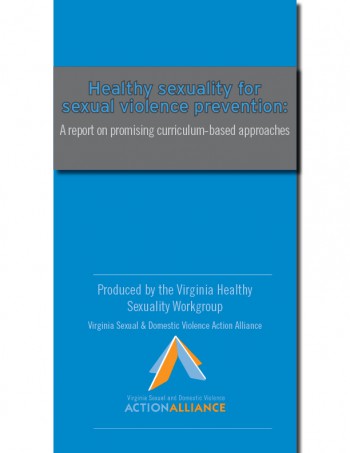
A distillation of and report on the top curriculum-based healthy sexuality programs. Produced by Virginia’s Healthy Sexuality Workgroup, which is charged with finding links between primary sexual violence prevention and sexual health promotion, determining each field’s evidence base, and discussing how to best deliver the vital information offered by both fields to youth in Virginia.
Published by Virginia Sexual & Domestic Violence Action Alliance. 2011
12 pages.
Honeycomb Reflection and Share Out
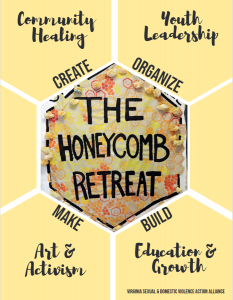
In July 2019 the Action Alliance organized and hosted a week-long retreat for young advocates, activists, and artists ages 17-23 called the Honeycomb Retreat. Our participants (fellows) went to workshops on systemic and interpersonal violence, consensual communities, zines for visionary futures, and using herbalism practices to heal from trauma. They also went to art sessions during which they worked with local artists-in-residence to create art in response to the things they were learning in their workshop and their own personal experiences. The week ended with a visioning session where fellows had the opportunity to talk about their skills they bring to our movement, the barriers that impact their full participation, the resources and support they need from adult allies, and what they are excited to do next!
This is an informational and reflective zine that describes some of our goals, frameworks, and outcomes—as well as a general overview of what happened at the retreat and who was there. Please do not hesitate to reach out and connect on these topics!
I Ask - Sexual Assault Awareness Month
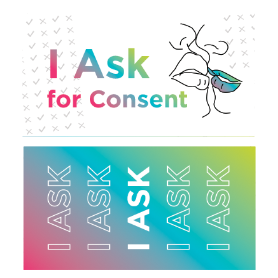
Sexual Assault Awareness Month (observed annually in April) is a campaign to raise public awareness about sexual violence and educate communities on how to prevent it. The campaign theme, I Ask, champions the message that asking for consent is a healthy, normal, and necessary part of everyday interactions. You can download and print materials for your Sexual Assault Awareness Month activities below!
- I Ask for Consent Palm Card and Handout cover the basics of knowing how to ask for and recognize consent. For best graphic quality, download the PDF and then print it out.
- I Ask for Digital Consent Palm Card and Handout discuss the importance of consent in online interactions. For best graphic quality, download the PDF and then print it out.
- I Ask How to Teach Consent Early Palm Card and Handout instructs parents on how to model consent with children in late childhood and early adolescence. For best graphic quality, download the PDF and then print it out.
- I Ask How Power Impacts Consent Palm Cards and Handout looks at the way imbalances of power impact consent. For best graphic quality, download the PDF and then print it out.
For additional resources, visit the National Sexual Violence Resource Center (NSVRC).
Indigenizing Love: A Toolkit for Native Youth to Build Inclusion
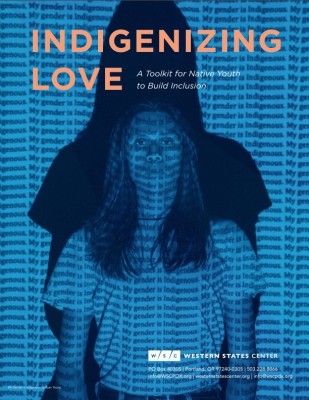
In response to requests from American Indian and Alaska Native (AI/AN) youth, Western States Center partnered with the Affiliated Tribes of Northwest Indians, the Center for Native American Youth, and Native Youth Leadership Alliance to develop a resource toolkit for and with young Native leaders.
This toolkit is written to support Native youth, tribal communities, Two-Spirit and Native LGBTQIA+ collectives, community leaders, and partners who intend to better understand and support our Two-Spirit and LGBTQIA+ communities. Native youth have asked for more resources on relationship building, caretaking, and inclusion of the TwoSpirit community. They want to better understand the important and diverse ways that Two-Spirit relatives and community members have sustained practices of making relations in spite of and beyond settler colonial violence.
Indigenizing Love refers to the idea of understanding and reclaiming our Indigenous ways of life (including kinship systems, shared values, and expressions of love), and resisting centuries of imposed settler colonial practices, policies, and thoughts that devalue our rights to share Indigenous knowledge and thrive. To Indigenize Love, we are rebuilding connections, kinship and relationships, and strengthening our abilities to love and care for all of our relatives.
Info Sheet from NSVRC
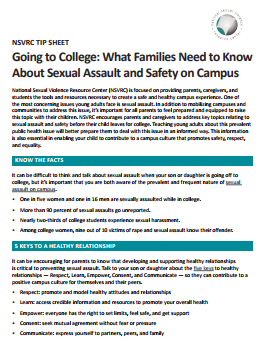
Sexual assault is a widespread problem on college campuses. This tip sheet provides information for families to discuss regarding campus sexual assault as well as safety, consent, and healthy relationships. A list of questions to ask about how your child’s college handles sexual assault is also included.

